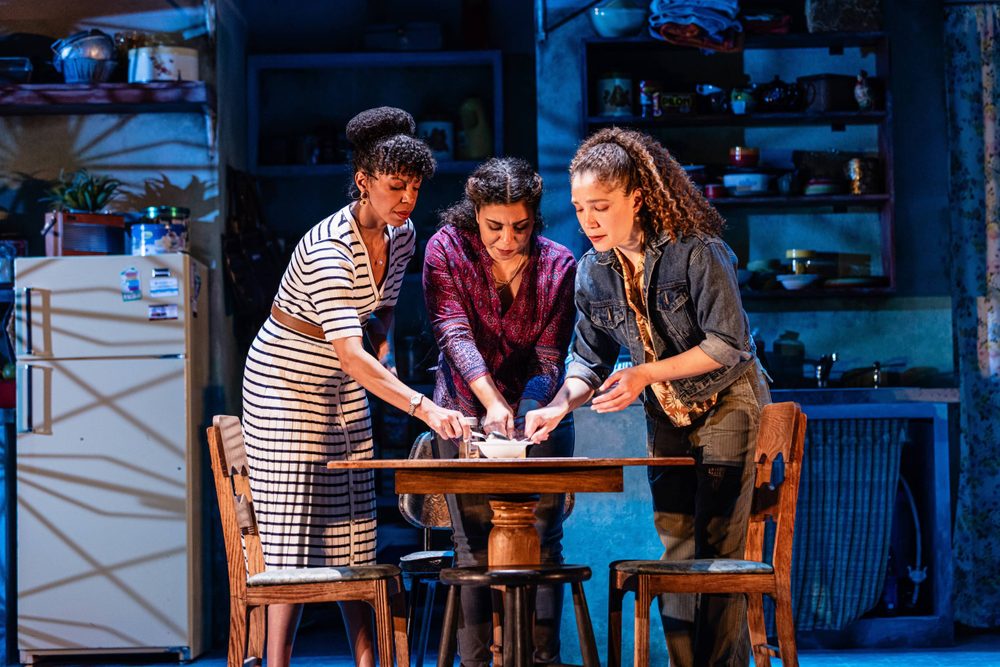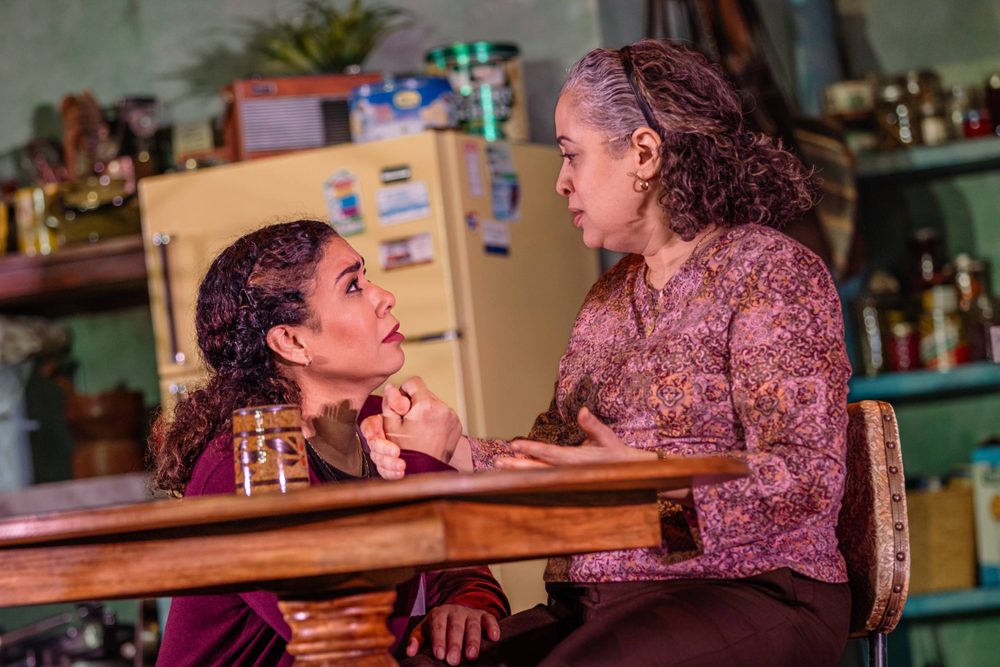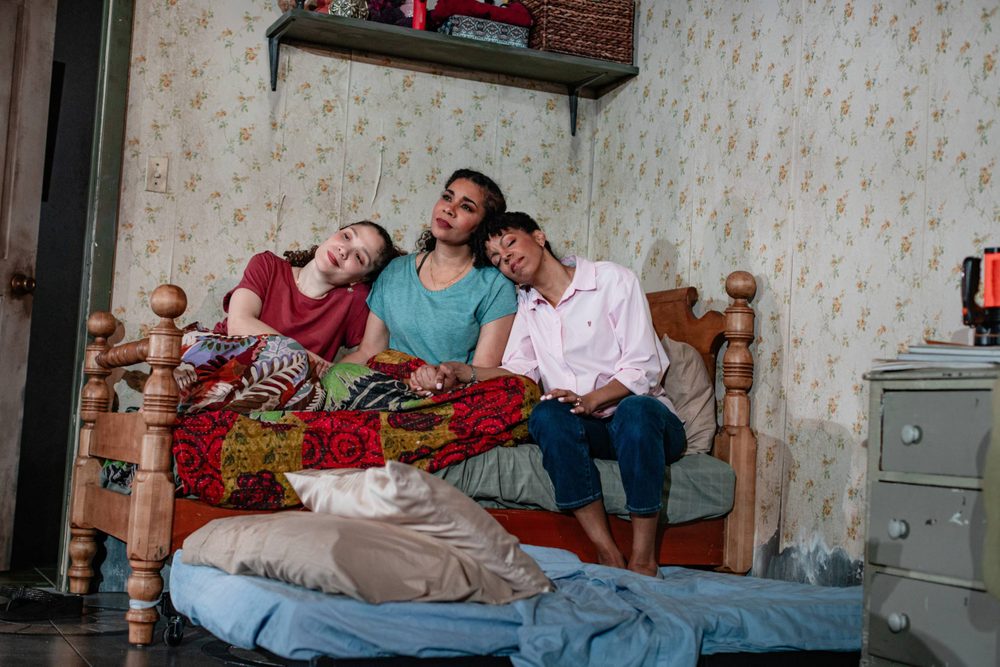
Photos by Marc J. Franklin
‘Don’t Eat the Mangos.’ Written by Ricardo Pérez González. Directed by David Mendizábal. Scenic Design by Tanya Orellana; Costume Design by Zoë Sundra; Lighting Design by Cha See; Sound Design by Jake Rodriguez; Original Music by Jake Rodriguez with Alexandra Buschman-Román and Jason Stamberger. Produced by The Huntington Theatre Company, Calderwood Pavilion, Boston Center for the Arts, 527 Tremont St., Boston, through April 27.
By Shelley A. Sackett
Don’t Eat the Mangos, Ricardo Pérez González’s one-act play, has a lot going for it. Set in 2019 in El Comandante, a neighborhood outside San Juan, Puerto Rico, Tanya Orellana’s bright island set plunks the audience smack into a festive, colorful vibe where curtains are doors and a commanding mango tree dominates the yard. We immediately meet three sisters, as different in personality as in looks, yet clearly cut from the same mold.
Of course, they are in the kitchen, where the women curse affectionately, call each other out, and demonstrate the kind of familiarity and genuine love that underlies their shrillest screaming matches.
Ismelda (Jessica Pimentel), the oldest, is all business. The most buttoned-up of the three, she has never married, remaining in the childhood home where she cares for their ailing parents and works as a loan officer. She is stoic and stubborn, bearing her burden but letting her sisters know she could use their help. She takes her role seriously; she actually dusts the plants.

Yinoelle (Yesenia Iglesias), the middle sister, is the most traditional of the three. Her husband is a successful construction manager who has an opportunity to move to the States. She is stylish, watches her figure and practically vamps with the spoon as she stirs the family dinner.
Wicha (Evelyn Howe) is the youngest, hippest and most passionate. She is a teacher and single mother who embraces causes and barely contains her wild hair. She is clearly comfortable in her own skin and, despite disapproving glares from the other two, plunks herself down at the table and eats cookies straight out of the tin. (That is, until Ismelda replaces the tin with the more proper plate and napkin).
This opening scene is one of the play’s best. González’s script has two goals, and he accomplishes both beautifully — we learn the family’s backstory and witness the sisters’ indelible bonds as they dance their unique sisterly dance.

They speak of Mami (Susanna Guzman), who has suffered a relapse of cancer, and Papi (José Ramón Rosario), who is paralyzed and requires a machine to constantly pump phlegm. The girls take turns dealing with him when a storm causes a power outage and they have to suction him by hand. It is during their discussions of how to settle up with a narcissistic man who neglected and abused his family that the true family dynamics – and secrets – are revealed.
As is often the case, each sister experienced a different version of what growing up in the same household was like and throughout the play, dyads share confidences with the admonition, “Don’t tell the others.” When Ismelda tells the truth about why the mango tree’s fruit lies uneaten and rotten despite the family’s need for food (no spoilers here!), bigger questions surrounding trauma, shame, blame, oppression and duty explode. Throughout the fabric of this micro private story, González masterfully interweaves threads of macro interest, such as the complicated relationship between Puerto Rico and the US, and whether abandoning one’s native island for the mainland is a cop out or no-brainer. “This place is not our future,” Yinoelle warns, to which Ismelda responds, “I stay so you can go.”
Guzman brings an understated grace and gravitas to Mami, the family’s glue and true north. She has parented with healthy doses of superstition, discipline and common sense. She alone holds the keys to both their pasts and futures, and her final gift is to set them all free.
Orellan’s set channels island life, with three rotating sets that feature a cozy but cramped kitchen, bedroom/hospital and backyard, complete with rusty gate and laundry line. Director David Mendizábal effectively and efficiently makes use of every inch, but it is Jake Rodriguez’s sound design, with lightning, insects and salsa, that fine-tunes the tone.
The acting is terrific, especially all three sisters who create a tight ensemble that provides for spotlighted individuality. Howe, as youngest sister Wicha, is a standout, with her malleable features, punchy delivery and irresistible physicality. One potentially macabre but wonderfully hilarious scene turns on the talent of this splendid actress.

For all its humor, pathos and big ticket, universal questions, however, ‘Don’t Eat the Mangos’ is not unflawed. González’s inclusion of Spanish in the script establishes place and context quickly and seamlessly, but he goes overboard with whole Spanish tracts at the very beginning of the play. Unless González’s intention is to make non-Spanish speakers feel deliberately excluded, then he needs to either trim the amount of Spanish or provide English Cliff Notes.
Equally confusing is the use of nicknames for characters the playbill lists by full names, particularly in the first few minutes. When they face away from the audience and are not easily understood, the problem is compounded. Finally, the play sometimes seems to be in the throes of an identity crisis, not sure whether to play a scene as straight drama, slapstick comedy, or some hybrid.
Yet, on balance, Don’t Eat the Mangos is entertaining, enlightening and thought-provoking, the trifecta gold standard that makes theater such a meaningful part of our lives. For more information, visit: https://www.huntingtontheatre.org/whats-on/dont-eat-the-mangos/

